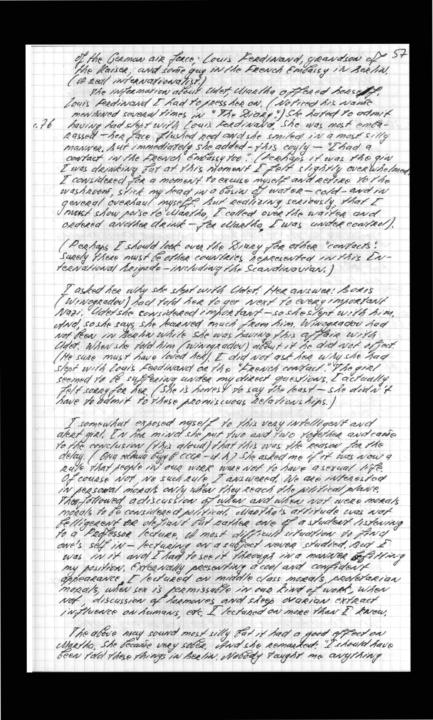Spies: The Rise and Fall of the KGB in America (87 page)
Read Spies: The Rise and Fall of the KGB in America Online
Authors: Harvey Klehr;John Earl Haynes;Alexander Vassiliev

While the KGB labeled Pressman a "traitor," his carefully limited testimony before the House Committee on Un-American Activities in 1950
and his interviews with the FBI sidestepped most of his knowledge of
the early days of the Communist underground in Washington and his
own involvement with Soviet intelligence, first with Chambers's GRU
network in the 193os and later with the KGB. He had never been the
classic "spy" who stole documents. Neither his work in domestically oriented New Deal agencies in the early 193os nor his later role as a labor
lawyer gave him access to information of Soviet interest. Instead, he functioned as part of the KGB espionage support network, assisting and facilitating its officers and agents. He gambled that there would not be anyone to contradict his evasions and that government investigators would
not be able to charge him with perjury. He won his bet, continued to
practice labor law, faded from the limelight, and died in 1969.
As the stories of these KGB couriers illustrate, espionage is more than the
source who steals a document and the professional intelligence officer
who recruits the spy and takes his material. There is an array of supporting personnel who make the espionage enterprise function: talent spotters, background checkers, radio operators, photographers, and couriers.
Without the work of these mostly American agents, Soviet intelligence in
America could have functioned at only a fraction of the effectiveness that
it actually did.


 he KGB, like any organization, had to make choices about
he KGB, like any organization, had to make choices about
where its assets would be deployed. From time to time it
pruned its stable of agents, deactivating those who ceased providing information or whose security became endangered. At
times a shortage of KGB officers necessitated breaking contact even with
productive sources. But the KGB was also sometimes obsessed with the
social status and celebrity connections of some of the agents it recruited
and continued to remain in contact with them while nurturing the futile
hope that they would produce useful intelligence. Meanwhile, it pursued
ideological enemies with a fervor so intense and out of proportion to their
threat that it sometimes interfered with efforts to obtain real secrets.
Franklin Roosevelt's appointment of William Dodd as ambassador to
Germany in 1933 placed a well-known anti-Nazi academic in a crucial position dealing with the new Hitler regime. Martha, his daughter, cut a
wide swath through Berlin, conducting affairs with a variety of diplomats
and some leading figures in the Nazi regime, and began a relationship
with the KGB that continued for decades. Martha Dodd had met Boris
Vinogradov (a Soviet diplomat and KGB co-optee) at a social event at the
Russian Embassy and offered to provide him with information, and "`he
soon became her lover.""
A 1941 report written in English by an American agent of the KGB on his meeting with Martha Dodd,
daughter of the American ambassador to Germany and a KGB source. Dodd discussed her use of sex to
elicit information when she was at the American Embassy in Berlin in the mid-1930s. Courtesy of Alexan-
derVassiliev.
By March 1934 Moscow Center had decided to formalize Dodd's
heretofore ad hoc collaboration with Vinogradov, sending instructions:
"`Tell Boris Vinogradov that we want to use him to carry out a project
that interests us. It has to do with the fact that, according to our information, the sentiments of his acquaintance (Martha Dodd) have fully
ripened for her to be recruited once and for all to work for us. So we request that V. write her a warm, comradely letter summoning her to a
meeting in Paris, where an operative of ours whom V. knows personally
will come. In Paris they will take the necessary actions to recruit Martha
for our work."' The recruitment was completed, and she was soon providing a steady stream of information to Vinogradov. When he was transferred back to Moscow, an Izvestia correspondent, Bukhartsev, replaced
him, although not in her affections. At meetings in 1936 she described
Moscow ambassador William Bullitt's views and behavior; conversations
between steel magnate Krupp (unclear if this refers to Gustav Krupp or
his son Alfred) and an American consul; and progress reports about her
intensive study of Lenin under the tutelage of Mildred Fish Harnack, an
American Communist married to a German. (During World War II both
Mildred and her husband Arvid became leading figures in a GRU network known as the "Red Orchestra." Both were arrested. Arvid was hung
and Mildred guillotined.) One KGB memo, apparently written sometime
in 1936, included Martha's claim that she helped her father in his diplomatic work and was "up to date regarding everything he is doing." A KGB
officer reported that "`Martha says the main interest in her life is secret
assistance to the cause of revolution.' "2
While she professed her loyalty to the USSR, Martha's personal life
complicated it. Her romance with Vinogradov, begun in 1934, did not diminish over time. She wanted to marry him; wrote him passionate letters
that the KGB monitored; and, on a visit to Moscow in 1937, officially requested permission for them to wed. Vinogradov told Moscow Center:
"Everything went well with Juliet No. 2 [Martha Dodd], and I think you did a
good thing by approving her visit to Moscow. But I don't quite understand why you have taken such an approving stance regarding our wedding? I asked you
to tell her that this is completely impossible and in any case will not work out
in the next few years. Yet you, according to her, spoke highly optimistically on
this subject and decided on a postponement of only 6 months or a year.... I
assured her in Warsaw before her trip to Moscow that if they tell her `yes'
there, then that's the way it will be, since she is dealing with highly authoritative people (`Manuilsky'). If no, then it's no. Six months will fly by quickly and
who knows-she could present a bill of exchange, which neither you nor I intend to pay. Wouldn't it be better to make your promises somewhat less categorical if you indeed made them."
(Dmitiy Manuilsky was a senior Comintern official and leading Stalinist.
Dodd, however, had been confused or misled. The man in Moscow with
whom she discussed marrying Vinogradov had been a senior Moscow
Center officer, not Manuilsky. In her early years of contact, the KGB allowed her to think she was working for the Comintern. Later she would
realize the truth.) In November 1937 the couple met in Warsaw (it would
be the last time), and Vinogradov reported:
"The meeting with "Liza" [Dodd] was successful. She was in a good mood. She
is leaving on 1,5 December for NY, where a meeting has been arranged with
her...... Liza" continues to be occupied with marriage plans and is waiting for
me to carry out our promise, despite the fact that her parents have warned
that nothing will come of it. The journalist Louis Fischer, who is not unknown
to you, has proposed to "Liza." She is not giving her consent, since she hopes
to marry me. But if we tell her that under no circumstances will I ever marry
her, then she will not be averse to accepting Fischer's proposal. I don't think
she can be left in the dark regarding the real state of affairs, because if we mislead her, she could become embittered and lose faith in us. At present she
consents to work for us, even if it becomes clear that I won't marry her."
Unrequited love, however, turned out to be the least of Vinogradov's
problems. The KGB arrested him and Bukhartsev as traitors and later
shot them. The executions were secret, and it would be years before
Martha realized that Vinogradov was dead.3
In early 1937, Abram Slutsky, chief of KGB foreign intelligence, forwarded to Nikolay Yezhov, people's commissar for internal affairs, a report
Dodd wrote and noted the KGB's high hopes for her utility:
Some time ago we recruited Martha Dodd, the daughter of the Amer. ambassador in Germany. We made use of her brief trip to the USSR for detailed talks
with her and determined that she has highly valuable capabilities and can be ac tively used by us on a broad scale. At our request, she has set forth herself her position in society, her father's position, and the prospects for her future work for us:
"Needless to say my services, of any nature and at any time, are available
to the party for it to use at its discretion. At present I have access mainly to the
personal confidential correspondence of my father and the State Department,
as well as the President of the US. The source of information on military and
naval matters, as well as aviation, is solely personal contact with the personnel
of our embassy. I have lost almost all contact with Germans, except perhaps
for chance encounters and meetings in society which yields almost nothing.
I still have contact with the diplomatic corps, but on the whole this doesn't
produce much. I have established very close contact with journalists. The Germans, foreign diplomats and our own personnel are suspicious, hostile and
(with regard to the Germans) insulting toward us. Is the information that I get
from my father, who is hated in Germany and who is isolated among foreign
diplomats, and therefore access for him to any secret information is closed,
important enough for me to stay in Germany? Couldn't I do more valuable
work in America or for some European organization like the International
Peace Conference, or the Spanish Agency, which have a bourgeois cover and
use bourgeois contacts? In America I'm not suspected of anything, except for
the Germans, and I have countless valuable contacts in all circles. In other
words, is my potential work valuable enough to stay in Germany, even for the
time that my father is here?
I've done everything possible to make my father stay in Germany-I'm still
going to continue doing everything I can in this direction-I'm afraid, however,
that he will retire in the summer or fall. He has been of great use in turning the
opinion of the Amer. govt. against the Nazis. At any rate that applies to Hull and
Roosevelt-most of the State Dept. staffers are working with the Nazis."
Impressed that his foreign intelligence arm had recruited the daughter of
an American ambassador, Yezhov sent the report, marked "Top Secret.
Eyes Only" to Stalin, requesting "instructions regarding the use of Martha
Dodd. 4
After Martha decided to return to the United States, Moscow informed illegal station chief Iskhak Akhmerov in January 1938 that she
was now in New York and provided contact information. But a monkey
wrench soon intervened. Legal station chief Ovakimyan told Moscow in
April that Dodd had been trying to find out Vinogradov's fate. Although
one handwritten comment on the message advised that the New York
station could accept a letter she wrote to him, the more important consideration was whether she was "`a deliberate accomplice"' of her now
disgraced lover. Moscow Center advised the New York station: "`Entrust contact with Luisa [Dodd] to a worker whose failure [exposure] would not
be very damaging to us; if L. is not giving valuable materials-leave her
alone."' A KGB officer in Moscow questioned Vinogradov, imprisoned
and awaiting his fate, and he refused to implicate Dodd in his "crimes."
Reassured, the KGB New York station put her in contact with Konstantin Kukin, personal secretary to the Soviet ambassador and a KGB operative.5
